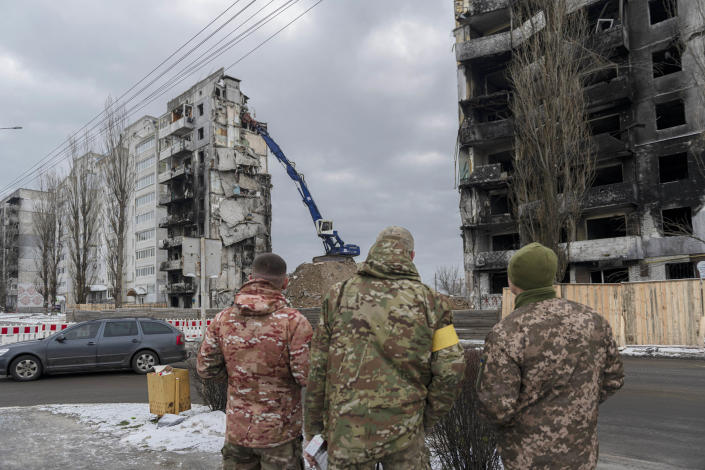The likely imminent approval of U.S. advanced air defense systems for Ukraine could offer a much-needed boost for its forces and a timely show of support from its allies as the country endures a long and difficult winter.
Washington is poised to satisfy Kyiv’s long-held and repeated request by sending Patriot missile systems, fulfilling its promise to further bolster Ukraine’s ability to thwart repeated Russian attacks on both its military sites and civilian infrastructure.
Approval of the plan by Defense Secretary Lloyd Austin is likely to come later this week, with an announcement possible as early as Thursday, three U.S. officials told NBC News.
The system will not only give Ukraine vital new strength to defend its cities against missile attacks, but also illustrates that the Kremlin’s grinding effort has done little to erode Western support for Kyiv’s cause, military analysts said. After a flurry of stunning Ukrainian victories on the ground, the news also hints at a recognition that conditions have shifted the war’s focus to the air as winter has set in.Patriot — the United States armed forces’ main surface-to-air weapon, which is also used across the world — is an acronym describing how its targeting system works for Phased Array Tracking Radar to Intercept on Target.
Patriot systems typically require crews of up to 90 to undergo at least 10 weeks of training, although as few as three soldiers can fire it if necessary, the U.S. Army has said, and Ukrainian armed forces have previously defied expectations in terms of how quickly their troops have learned to use Western weaponry.
Ukraine’s bitter winter is being felt across the country, with many areas without power or heating after bombardment by Russian forces destroyed power plants, lines and substations. Temperatures were set to reach as low as 21 degree Fahrenheit on Wednesday night in the capital.
The cold weather and the onset of thick mud, a notable obstacle for the invading Russian vehicles at the start of the war in February, are expected to slow combat operations on the ground, but aerial strikes and drone attacks have so far continued.
The war has become, in the eyes of some Western officials, a battle over who has the most ammunition.
Experts said the likely Patriot offer comes after months of intense Russian attacks that have pushed Ukrainian defenses, mostly Cold War-era equipment it inherited from the breakup of the Soviet Union, to beyond their limit.
“As we move into the winter, the amount of maneuver operations on the ground in the war is going to decrease for all the reasons that we know, weather, conditions and so on,” Jonathan Eyal, an associate director at the Royal United Services Institute think tank in London, told NBC News.
“So it’s very likely Russia is going to keep up pressure from the air by trying to systematically destroy Ukrainian infrastructure. So it is therefore very important for Ukraine’s Western backers to look again at Ukraine’s air defenses. The timing is important,” he said.


Early Wednesday, existing Ukrainian air defenses shot down 13 Iranian-made Shahed drones in the nation’s capital, the Kyiv City Military Administration said on its Telegram channel. Senior U.S. officials believe Russia is providing unprecedented military and technical support to Iran in exchange for weapons.
Patriot missiles don’t solve the problem of drones, which are too small to be detected by most air defense systems, Eyal added, but the new weapons do provide an important additional air defense layer to the Ukrainian military.
Also, given the grinding, attritional nature of the war — now more than 300 days old — the supply of state-of-the-art weapons shows that Ukraine’s Western backers will not tolerate Russian President Vladimir Putin’s repeated targeting of civilian infrastructure.
“The political message to the Russians is that they can’t continue destroying Ukraine’s infrastructure with impunity, which is what Putin does every day. They can’t do that without the West delivering better and more sophisticated weapons to the Ukrainian military,” Eyal said.


Former Russian President Dmitry Medvedev, who is the deputy chairman of Russia’s Security Council, has said that should Washington provide Kyiv with Patriot systems, they would become legitimate military targets.
Asked whether he agreed with this at his daily press briefing Wednesday, Kremlin spokesman Dmitry Peskov said: “Definitely,” before saying he was waiting for more information before commenting further.
Ukraine has been asking for increased surface-to-air firepower since long before Moscow’s full-scale invasion this year.
As Russian tanks rolled across the border in February, current and former American officials and defense experts told NBC News that a number of fears — including that weapons could provoke Russia or fall into Russian hands — prevented the U.S. and its allies from granting the Ukrainian requests.


For some analysts, this reluctance was the result of a Russian campaign to intimidate the West, which is only now being ignored.
“This is another step in the U.S. steadily overcoming Russia’s successful efforts at deterring it from aiding Ukraine,” said Keir Giles, an expert on Russia and a consulting fellow at Chatham House, a London think tank.
“We’ve seen an incremental process of the U.S. supplying more essential capabilities to Ukraine as it becomes clear that Russia’s ‘red lines’ are no more than bluff and bluster, like so much of the Kremlin’s rhetoric,” he said.
Giles added that the Patriot missiles offer from the U.S. was also a recognition that the nature of the war has changed: from a series of ground offensives in an attempt to capture major cities in February, to bombarding civilian centers and struggling to retain captured territory now.
“The vital battle for the future of Ukraine is not on the front line — instead it is in protecting the civilian population and key centers from Russia’s drone and missile campaign designed to end Ukrainian resistance by making the country uninhabitable,” he said.
This article was originally published on NBCNews.com




